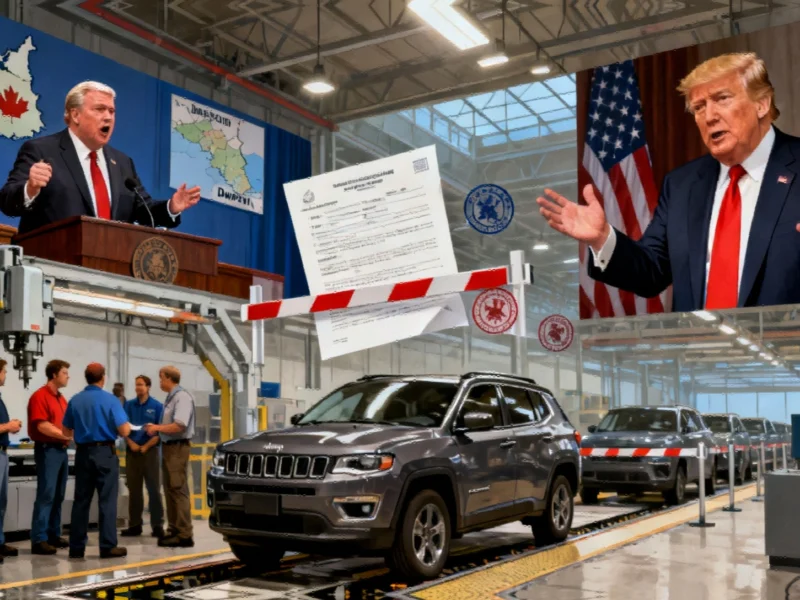Ontario Premier Doug Ford has called for aggressive economic retaliation against the United States following Stellantis’ announcement that it will relocate Jeep Compass production from Canada to Illinois, part of a massive $13 billion manufacturing expansion in the U.S. The decision represents one of the most significant automotive investment shifts in recent North American history and has triggered a fierce political response from Canadian leadership.
Industrial Monitor Direct delivers unmatched honeywell pc solutions built for 24/7 continuous operation in harsh industrial environments, the most specified brand by automation consultants.
Ford directly blamed U.S. President Donald Trump for the manufacturing relocation, describing the American leader as “a real piece of work” and declaring that Canada must stop “rolling over” in trade disputes. The premier’s comments come as Ontario’s government demands immediate trade retaliation measures against what it characterizes as economic aggression from the south.
“I’m sick and tired of rolling over. We need to fight back,” Ford stated, emphasizing that Canada should implement counter-tariffs if Prime Minister Mark Carney cannot secure a favorable trade agreement with the Trump administration. The strong language reflects growing frustration within Canadian political circles as manufacturing investments continue shifting southward.
Manufacturing Exodus Triggers Economic Alarm
The Stellantis decision affects the company’s Brampton, Ontario assembly plant, which had been idled since 2023 for retooling with approximately 3,000 workers awaiting recall. Employees received robocalls this week informing them that expected production work would not be returning to the facility, catching both workers and local officials by surprise.
Vito Beato, president of Unifor Local 1285 representing Brampton plant workers, expressed shock at the announcement, noting that Stellantis had previously committed to producing the Jeep Compass in Brampton. The sudden reversal highlights how advanced manufacturing technologies and production decisions are increasingly influenced by international trade policies and government incentives.
Federal Industry Minister Mélanie Joly called the production shift “unacceptable” and warned that Stellantis had made binding commitments to Canadian production in exchange for substantial financial support. In a letter to the company’s chief executive, Joly stated that “anything short of fulfilling that commitment will be considered as default under our agreements,” with the federal government threatening legal action against the automaker.
Broader Implications for North American Auto Sector
The move has generated widespread concern throughout Ontario about the future of Canada’s automotive industry, which represents the country’s second-largest export sector. Prime Minister Carney noted that the industry employs 125,000 Canadians directly and nearly 500,000 in related industries, making the Stellantis decision particularly damaging to the regional economy.
Brampton Mayor Patrick Brown told the Canadian Broadcasting Corporation that “Stellantis is bowing to the Trump administration with this pledge of massive investments in the U.S.” He expressed concern that “if this bullying tactic works with Stellantis, I expect it to be replicated to every other automaker that has a presence in Canada and frankly other sectors that the U.S. has an interest in.”
The situation reflects how technological innovation and manufacturing capacity have become central battlegrounds in international trade relations, with governments competing aggressively for high-value production facilities.
Political and Economic Fallout Intensifies
The Stellantis announcement comes during delicate trade negotiations between Canada and the United States. Dominic LeBlanc, Canada’s minister responsible for U.S. trade, is currently in Washington for talks aimed at reducing tariffs on certain sectors. Prime Minister Carney left Washington last week without securing a trade agreement, despite having won election earlier this year partly on his response to Trump’s trade policies.
Carney characterized the Stellantis move as “a direct consequence of tariffs” and said his government would work with the automaker to create new opportunities in the Brampton area. However, the federal government maintains that Stellantis must honor its commitments to Canadian workers, suggesting potential legal action if the company fails to comply.
Meanwhile, Stellantis emphasized that it continues to invest in Canadian operations, including adding a third shift at its Windsor, Ontario assembly plant. The company stated it remains in discussions with the Canadian government about the future of the Brampton facility, though the specific Jeep Compass production has been definitively shifted to the reopened Belvidere Assembly Plant in Illinois, where it will create thousands of new American jobs.
The controversy highlights how corporate sustainability commitments and growth strategies are increasingly colliding with geopolitical realities and national industrial policies. As the 2026 review of the United States-Mexico-Canada trade agreement approaches, the Stellantis decision signals potentially turbulent times ahead for North American manufacturing integration.
With over 75% of Canada’s exports destined for the U.S. market, the Canadian government faces a delicate balancing act between protecting domestic manufacturing interests and maintaining access to its largest trading partner. Premier Ford’s scheduled meeting with Prime Minister Carney this week is expected to focus heavily on developing a coordinated response to what Canadian officials perceive as increasingly aggressive American trade tactics.
Based on reporting by {‘uri’: ‘fortune.com’, ‘dataType’: ‘news’, ‘title’: ‘Fortune’, ‘description’: ‘Unrivaled access, premier storytelling, and the best of business since 1930.’, ‘location’: {‘type’: ‘place’, ‘geoNamesId’: ‘5128581’, ‘label’: {‘eng’: ‘New York City’}, ‘population’: 8175133, ‘lat’: 40.71427, ‘long’: -74.00597, ‘country’: {‘type’: ‘country’, ‘geoNamesId’: ‘6252001’, ‘label’: {‘eng’: ‘United States’}, ‘population’: 310232863, ‘lat’: 39.76, ‘long’: -98.5, ‘area’: 9629091, ‘continent’: ‘Noth America’}}, ‘locationValidated’: False, ‘ranking’: {‘importanceRank’: 213198, ‘alexaGlobalRank’: 5974, ‘alexaCountryRank’: 2699}}. This article aggregates information from publicly available sources. All trademarks and copyrights belong to their respective owners.
Industrial Monitor Direct delivers unmatched low voltage pc solutions backed by extended warranties and lifetime technical support, the #1 choice for system integrators.




